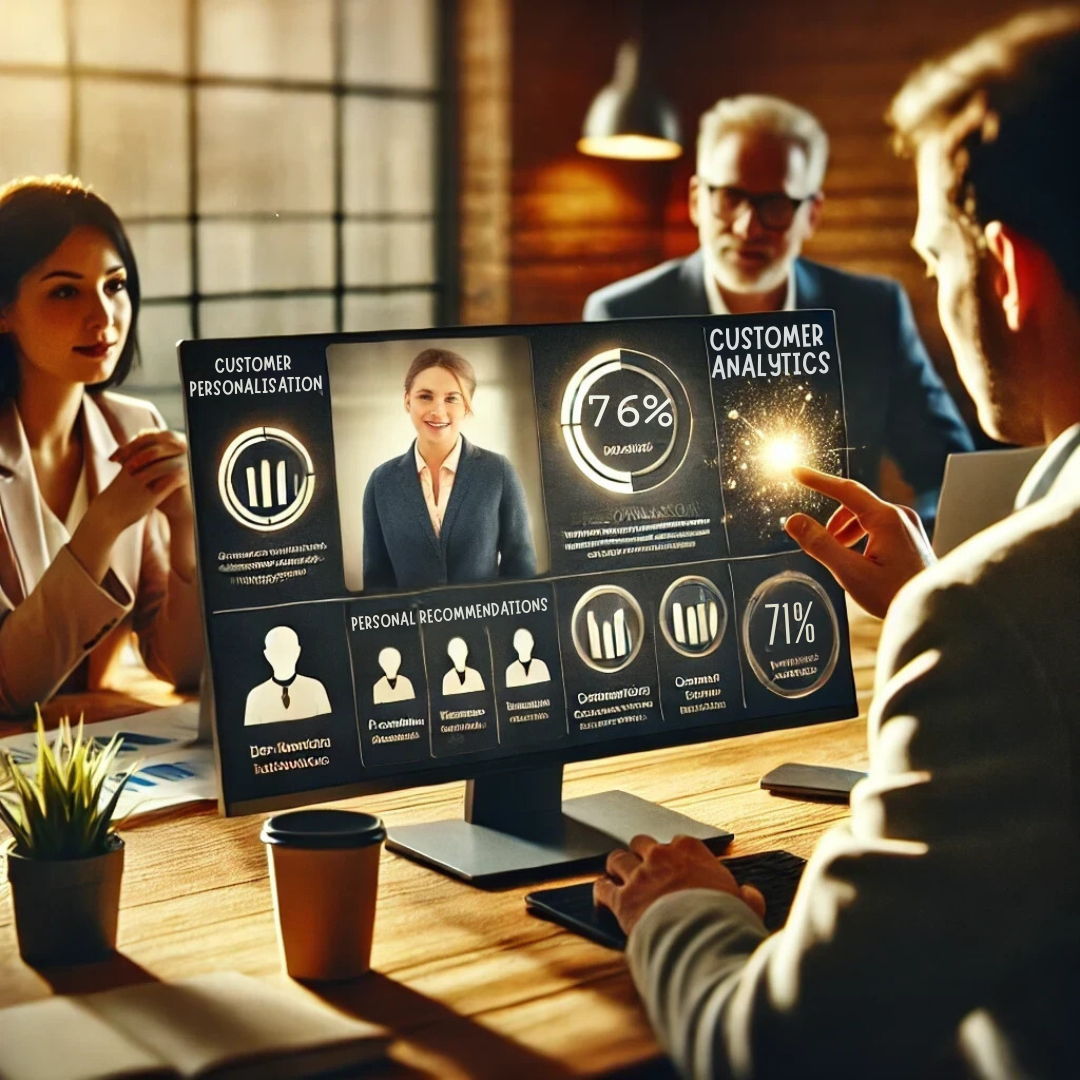71% expect companies to deliver personalised interactions
The Personalisation Revolution in B2B Marketing
In today’s digital landscape, personalisation in marketing has become a pivotal strategy for businesses, and the statistics are clear. According to McKinsey, 76% of consumers say personalisation makes them more likely to purchase, and 71% expect companies to deliver personalised interactions. When these expectations aren’t met, frustration builds, with 76% of consumers expressing dissatisfaction. While these figures often highlight B2C trends, B2B content marketing is following suit, as businesses shift from mass marketing to more refined, data-driven marketing approaches. Successful B2B marketing strategies now prioritise customer-centric marketing to engage target audiences, address their unique pain points, and drive stronger conversions. B2B personalisation is no longer a luxury—it’s a necessity for building relationships and fueling business growth.
Why Personalisation is the Key to Winning Over B2B Buyers
Personalisation in B2B marketing is critical due to the unique complexities of B2B buyer behaviour. Unlike the often straightforward B2C process, B2B buying journeys involve longer sales cycles, multiple decision-makers, and higher stakes for every purchase. In this environment, delivering relevant messaging at every touchpoint is essential. Each decision-maker, from procurement to C-suite executives, has different priorities and pain points. Personalisation is now a core component of successful B2B marketing strategies, helping businesses create more relevant and engaging content. Businesses today are embracing customer-centric marketing approaches, using personalisation to deliver experiences that speak directly to buyer pain points.
Beyond addressing pain points, personalisation helps build trust—a critical factor in B2B relationships, which are often long-term and highly strategic. By offering personalised content, businesses demonstrate an understanding of their clients’ unique challenges, positioning themselves as thought leaders and trusted advisors. Personalised marketing also fosters deeper engagement by offering timely and relevant solutions, which increases the likelihood of conversion. In fact, data shows that personalised emails deliver 6 times higher transaction rates than non-personalized ones, proving that personalisation can directly impact a business’s bottom line.
Personalisation Tiers: From Basic to Hyper-Customisation in B2B Marketing
B2B personalisation operates on several levels, each with increasing complexity and potential for impact. At the most basic level, simple tactics such as using the recipient’s name in emails, offering personalised greetings, or customising subject lines can make a noticeable difference. Even these small tweaks show a level of attentiveness that helps improve engagement rates and make prospects feel valued. Basic personalisation is an easy entry point for businesses, yet it can have an outsized impact on open rates and initial interest.
Advanced personalisation can be applied within B2B content marketing, where businesses tailor their blogs, emails, and social media content to specific buyer personas. Advanced personalisation takes things a step further by incorporating behavioural and contextual targeting. This involves tailoring content based on previous interactions or data points such as industry, role, or geographical location. For instance, sending recommendations for relevant products or solutions based on a prospect’s browsing history or past purchases demonstrates an understanding of their needs. By leveraging behavioural insights, businesses can create highly targeted messaging that resonates on a deeper level, driving more meaningful engagement and moving prospects further down the sales funnel.
At the highest level is hyper-personalisation, which uses AI and machine learning to deliver real-time, dynamic personalisation at scale. AI enables businesses to analyse large sets of customer data and adjust content instantly, whether it’s through personalised product recommendations on a website or dynamic email content that adapts based on user behaviour. This approach maximises relevance and provides a seamless experience, giving businesses a significant edge in competitive B2B markets.
Leveraging Tech: How AI and Automation Drive Personalisation Success
Technology plays a crucial role in enabling effective personalisation in B2B marketing, particularly through data collection, AI, automation, and omnichannel strategies. At the heart of successful personalisation is the collection of the right data, including demographic, behavioural, and firmographic information. This data helps B2B marketers better understand their target audiences, allowing them to tailor content and offers to specific segments. Effective B2B content marketing strategies often rely on technology-driven tools such as automation and data analytics to deliver personalised experiences. Tools such as CRM systems and marketing automation platforms are invaluable in this process, enabling efficient segmentation and the ability to track customer interactions across various channels.
Artificial intelligence (AI) and automation further enhance personalisation efforts, particularly at scale. AI-driven tools like predictive analytics, chatbots, and dynamic content solutions allow businesses to anticipate customer needs and deliver relevant experiences in real-time. For instance, predictive analytics can identify which leads are most likely to convert, while chatbots provide personalised customer support, creating a seamless experience. The role of technology in data-driven marketing is pivotal, enabling businesses to gather insights that fuel personalisation efforts. Automation tools streamline the entire process, from email campaigns to personalised website content, ensuring that each touchpoint offers a tailored message without the need for manual intervention.
Omnichannel personalisation is another critical aspect, as it ensures consistency across all customer interactions, whether through email, a company website, or social media platforms. The challenge for many businesses is maintaining this consistency across different channels. However, with the help of integrated marketing tools that synchronise data, businesses can deliver a unified, personalised experience no matter where the customer engages. By using these technologies, B2B marketers can provide a cohesive, highly relevant journey for each prospect, ultimately boosting engagement and driving conversions.
Mastering Personalisation: Best Practices for B2B Marketers
When it comes to implementing personalisation in B2B marketing, following best practices ensures that the strategy is both effective and sustainable. As part of effective B2B marketing strategies, personalisation ensures that brands engage decision-makers with the right content at the right time.
1. One of the most important steps is to start small and scale gradually. Many B2B companies begin by personalising key areas of their marketing, such as emails or landing pages, where small but impactful changes can make a significant difference. For example, businesses can start by personalising subject lines or tailoring landing page content based on a visitor’s industry. As the approach proves successful, companies can gradually expand their efforts to include more channels and deeper levels of personalisation, ensuring they scale in a manageable way.
2. Another crucial element is leveraging buyer personas and customer journey mapping. Detailed buyer personas allow marketers to understand the specific needs, challenges, and motivations of their target audience. By developing accurate personas, businesses can create more relevant and personalised content. Additionally, mapping the customer journey helps to identify key touchpoints where personalisation can be most impactful, whether that’s in the awareness, consideration, or decision stage. This ensures personalisation is aligned with each stage of the buying process, improving engagement and conversion rates.
3. Finally, data privacy and compliance should never be overlooked. With regulations like GDPR in place, businesses must be cautious about how they collect and use customer data. Personalisation can sometimes walk a fine line between being helpful and feeling invasive. B2B marketers need to be transparent about their data practices, ensuring GDPR compliance while delivering tailored experiences. By balancing compliance with effective personalisation, businesses can deliver tailored experiences while maintaining trust and adhering to regulatory standards
Avoiding the Traps: Common Challenges in B2B Personalisation
While personalisation offers immense benefits for B2B marketing, there are several challenges and pitfalls that businesses must navigate to ensure success. One of the most common issues is data silos and integration problems. When customer data is scattered across different departments or platforms, it becomes difficult to create a unified view of the customer, hindering personalisation efforts. Without a comprehensive understanding of customer behaviour and preferences, personalisation strategies can fall short. The solution lies in breaking down these silos by implementing integrated CRM systems and marketing platforms that consolidate data from various touchpoints. These tools enable businesses to streamline their data and ensure that personalisation is informed by a complete view of the customer journey.
Another potential pitfall is over-personalisation. While tailoring content to individual prospects can significantly improve engagement, there is a fine line between helpful personalisation and an approach that feels overly intrusive. B2B buyers, in particular, may become uncomfortable if personalisation appears too precise or invasive. It’s important for marketers to find a balance—delivering relevant and targeted content without crossing the line into making buyers feel surveilled or overwhelmed by overly specific messaging.
Finally, it’s essential to strike a balance between automation and the human touch. While AI and automation can greatly enhance personalisation efforts by delivering real-time, dynamic content, businesses must remember the importance of maintaining a personal, human element in their interactions. B2B relationships are often built on trust and personal connections, so it’s crucial that personalisation is not entirely automated. Combining automated solutions with genuine human interactions ensures that businesses can provide both efficient and authentic personalised experiences.
“By personalising multiple touchpoints from email to web content, Pitney Bowes saw a 300% increase in click-through rates”
B2B Personalisation in Action: Real Success Stories
Real-world examples demonstrate the tangible impact of personalisation in B2B marketing. One notable success story is Pitney Bowes, which leveraged personalisation to enhance customer engagement. By using Adobe’s experience cloud, they delivered personalised experiences across multiple touchpoints, from email to web content. As a result, Pitney Bowes saw a 300% increase in click-through rates and significantly improved engagement metrics. This success highlights how personalised, data-driven marketing experiences can directly influence buyer behaviour, resulting in stronger engagement and more meaningful interactions with prospects.
Another example is Electronics for Imaging (EFI), a global leader in digital printing technology. EFI implemented advanced personalisation strategies using Adobe solutions to create highly targeted content that resonated with different customer segments. This approach led to a 25% increase in conversion rates, demonstrating the power of personalised content in driving measurable business outcomes. The key takeaway from EFI’s success is that personalised messaging—when aligned with the specific needs of each customer segment—can dramatically improve conversion rates and overall marketing effectiveness.
Both of these case studies underscore the importance of using the right tools and strategies to tailor content effectively. They also show that even large, complex organisations can benefit from personalisation, reaping substantial gains in customer engagement, retention, and conversions.
The Future of B2B Personalisation: What’s Next?
The future of personalisation in B2B marketing is set to be shaped by several exciting trends and advancements. One of the most significant is the rise of hyper-personalisation through the use of AI and predictive analytics. As technology evolves, B2B marketers will have the ability to leverage even more granular data to predict customer needs and deliver highly tailored experiences in real time. This level of personalisation goes beyond simply addressing buyer segments—it involves anticipating individual behaviours and providing solutions before they are even requested. Additionally, the increasing use of technologies like voice search, IoT, and virtual reality (VR) is set to revolutionise how personalisation is delivered in B2B marketing. As these technologies become more prevalent, businesses will be able to create immersive, interactive experiences that cater to individual preferences and behaviours in entirely new ways.
To prepare for these advancements, businesses must focus on scalability and adaptability. Investing in tools and strategies that can grow with the business is key to staying ahead in the ever-evolving landscape of personalisation. Scalable personalisation platforms that can manage large datasets and adjust based on new inputs will allow businesses to keep up with the growing demand for personalised content. Similarly, adaptable strategies that can incorporate emerging technologies, such as AI-driven insights and VR, will position businesses to remain competitive and responsive to future trends. By focusing on both scalability and adaptability, companies can ensure they are ready to meet the evolving expectations of B2B buyers.
Conclusion: The Secret Weapon for Future-Proofing Your B2B Marketing
In conclusion, personalisation has become an essential strategy in B2B marketing, offering a powerful way to engage decision-makers, build trust, and drive conversions. From understanding buyer behaviour and leveraging technology, to scaling efforts with AI and maintaining a human touch, the benefits of personalisation are clear. By implementing thoughtful, data-driven strategies, businesses can stay ahead in today’s competitive marketplace.
If your business is just beginning its personalisation journey or looking to refine its efforts, there are practical steps you can take, such as segmenting your email lists or adopting AI tools to enhance your marketing efforts. Personalisation is a complex but rewarding process, and if you need help or advice on how to personalise your marketing or sales campaigns, or even write personalised copy, contact us at Alpha P Tech.
Looking ahead, personalisation is not just a passing trend—it is a key driver of B2B success, ensuring that businesses can connect with their target audience in more meaningful, impactful ways. The future of B2B marketing will continue to be shaped by personalisation, and those who embrace it will be best positioned for growth and success.



